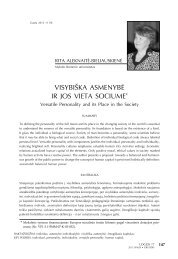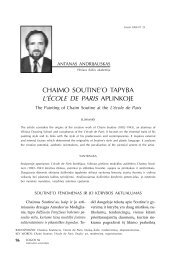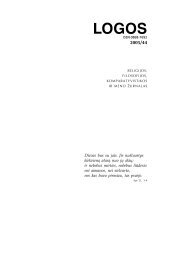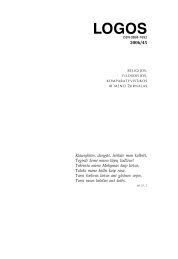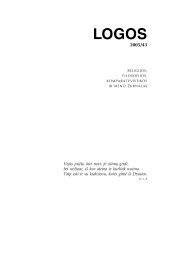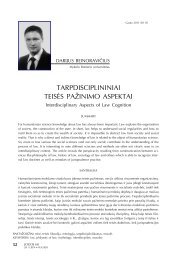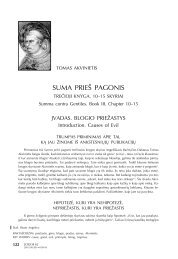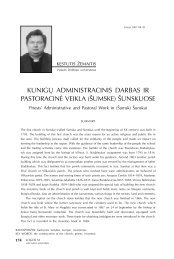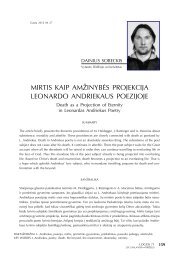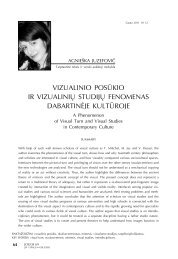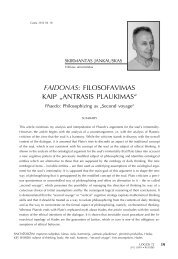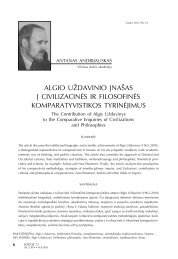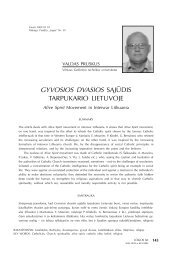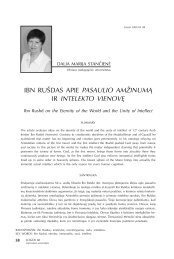Bet kvailas žmogus įgis supratimą, Kai laukinė a - Logos
Bet kvailas žmogus įgis supratimą, Kai laukinė a - Logos
Bet kvailas žmogus įgis supratimą, Kai laukinė a - Logos
You also want an ePaper? Increase the reach of your titles
YUMPU automatically turns print PDFs into web optimized ePapers that Google loves.
LEONID KARPOV<br />
66<br />
LOGOS 42<br />
2005 BALANDIS • BIRÞELIS<br />
LEONID KARPOV<br />
Kauno technologijos universitetas<br />
NEBÛTIES PROBLEMA<br />
The Non-Being Problem<br />
SUMMARY<br />
Gauta 2004-12-10<br />
Pabaiga. Pradþia „<strong>Logos</strong>“ Nr. 41<br />
This paper is dedicated to the problem of non-being. The metaphysical category of non-being is rather<br />
indefinite because it has practically not been studied by scholars and philosophers. This situation springs<br />
from specific features of European culture emphasising existence and life, unlike Egyptian and Tibetan<br />
cultures. To define the category of non-being means to set its place within the context “God – being”,<br />
i.e. to find out the relations between the mentioned concepts. Second, we need to clarify the implication<br />
of nothing that underlies being and non-being.<br />
For the Christian religion, God created the Universe from nothing that separates Him from it. In a<br />
sense, He is transcendent, beyond space and time. Before the Creation, just God existed. It signifies<br />
that even nothing was created by the Lord. In turn, created nothing must be understood as an absolute<br />
absence. The transcendence of God implies that He is not present in our world. In other words, God<br />
is not identical to nothing as an absolute absence. He is nothing in the sense of substance, i.e. He is<br />
Nothing producing nothing (absolute absence) and the world. Divine Nothing exists in the sense pointed<br />
to by the Holy Bible: “I am that I am” (other translations of the Hebrew text: “I am the Being”, “I am<br />
the Existing One”, “I am who I am”, etc).<br />
The Antique world identifies non-being with absence. For example, for Democritus, non-being is<br />
emptiness in the physical sense – a cavity (unfilled space). For Plato, non-being is a part of becoming<br />
– our empirical world. Chinese philosophers even introduced a gradation of non-being. Aristotle transforms<br />
the non-being concept into a notion of possibility existing in the empirical world.<br />
I think non-being primarily concerns being, like Aristotle’s possibility dominates reality (being).<br />
Analogically motion conditions rest. In the psychological realm, non-being may be identified with unconsciousness.<br />
RAKTAÞODÞIAI. Bûtis, nebûtis, niekas, kas, sàmoningumas, nesàmoningumas, Dievas, Ðëtonas, Liuciferis.<br />
KEY WORDS. Being, non-being, nothing, thing, consciousness, unconsciousness, God, Satan, Lucifer.



